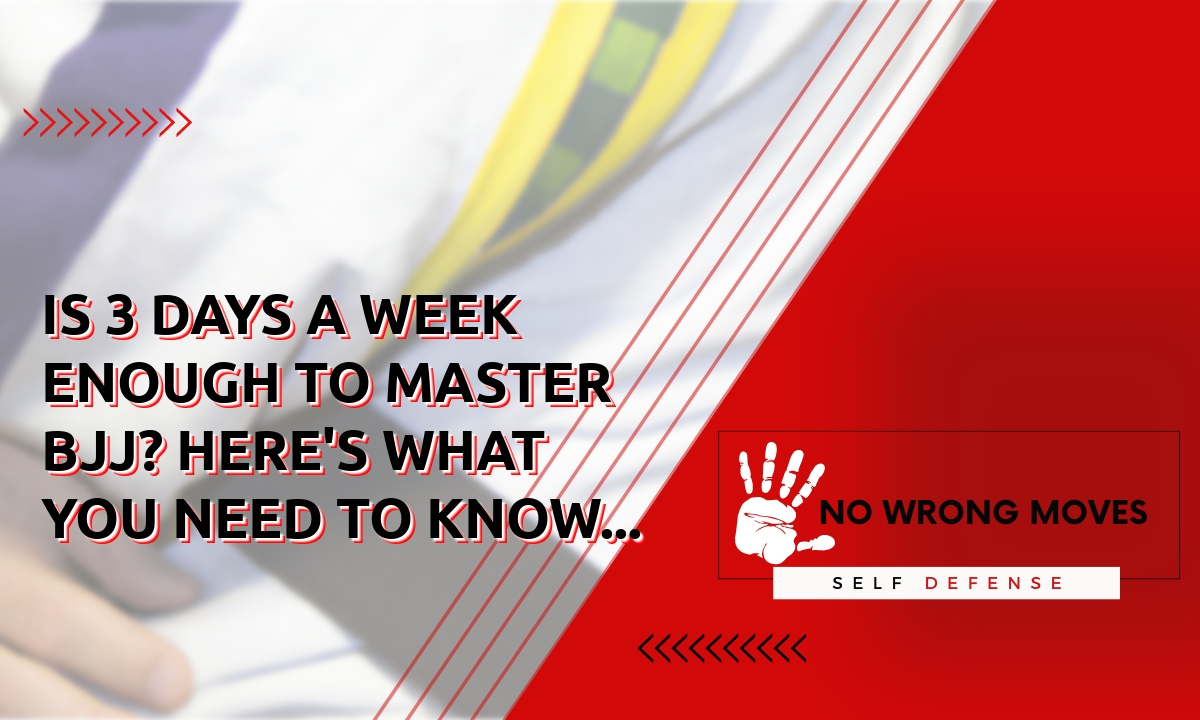
It's easy to get passionate about BJJ, but finding the right balance it and your other responsibilities should still be among your top priorities. Many people are keen on training five or even six times a week, but some can only go for three.
If you're one of those people, then you're probably curious if three is even enough for you to become proficient at the sport. Don't worry, that's what we'll be talking about here today.
Understanding BJJ
BJJ is a martial art founded in 1925 by the Gracie brothers, using elements from judo as a foundation. It relies on grapples and ground fighting to destabilize and immobilize opponents, even if they are bigger and stronger.
One of the key ideas behind this martial art is that anyone can learn it and apply it effectively, provided that they train diligently and consistently.
If all you can manage is training three times a week, then don't worry too much. Yes, generally, three days a week will be enough. If you're short on time, then there's a lot you can learn in the dojo even if you only go thrice a week. There are some things you'll need to keep in mind though.
First, when it comes to BJJ, consistency is key. Just like a dedicated workout, coming in for an occasional session or two every now and then isn't effective. And even if it did yield results for you, they won't be anywhere near as great as if you attended regularly.
Your instructor will both keep you motivated on top of helping you improve your technique, but remember that the commitment needed to excel will come from you, first and foremost.
So when it comes to staying disciplined and consistent with your training, you can be either your number one friend... or your number one enemy. Be sure to pick wisely!
Next, BJJ is a deeply nuanced martial art. It's one of the most difficult to learn for a reason, especially when it involves difficult-to-apply concepts like weight distribution, leverage points, and positioning.
When you roll, both you and your sparring partner strive for technical excellence. You don't just rush through repetitions! You keep going with accuracy and precision, not necessarily speed.
In fact, among the most important things in any martial art is good technique, and this is all the more true for Brazilian jiu-jitsu. That means it can take months, or even years, to perfect certain moves, so adequate time investment really is necessary if you want to excel at BJJ.
Of course, you can still absolutely do that if you only train three times a week, but your progress will be much slower. BJJ is already quite notorious for the lengthy intervals between each rank, so adding more intervals between each training session won't do any good for you.
How Often Should You Train?

If you're trying to become a professional athlete or are just really passionate about jiu-jitsu, then you should strive for training 5 to 6 times a week, with 90 minutes each session.
This will help make sure everything you learn sticks to your head, and that you go at a much quicker, much healthier pace.
If it's just not possible for you to train that often every week, then we get you! Sometimes our circumstances just can't permit that. If this is the case, then try supplementing your training with other relevant activities, like strength and conditioning exercises.
It'd be much better if you had a sparring partner to do this with, but if you don't, that's okay. Strength training, drilling, and conditioning exercises will still work wonders for you, even when done on your own or without the supervision of your instructor. Just be careful to avoid injury!
Naturally, these personal sessions aren't going to be as good as live sessions in the dojo, but this will at least make sure that you don't lag too far behind from your goals.
Plus, they're great for working on improving specific skills, which you might not necessarily want to spend time on in training. There's always so much to learn and practice in BJJ, after all, and you'll want to maximize the time your time spent in the dojo as much as possible.
Benefits Of Training Three Times A Week

Practitioners that attend class at least three times a week will notice slower overall progress compared to those who go five times a week, but they will still be accustomed to the physical and mental aspects of BJJ, which are among its most important aspects to learn and get used to.
They'll also learn how to remain calm and react quickly regardless of the situation, whether it's while rolling in the dojo, fighting in a competition, or in a real-life self-defense scenario.
You can also expect them to build up their confidence and gain a much greater sense of self-worth. Being proud of your body as well as being physically independent are both wonderful things to feel, and BJJ is known to provide that to its practitioners.
And arguably the main benefit of you training three times a week over two or five is that you'll be getting a lot out of BJJ while still having time for your other commitments.
You're an adult working a full 9 to 5? You won't be draining yourself everyday just to keep up at BJJ. Your dojo's too far away, and you can't consistently go there everyday? That's okay, just go thrice a week!
Drawbacks Of Taking Too Many Classes

When you don't attend your BJJ classes consistently, you endure the natural consequence of undertraining, which not training enough and not properly absorbing the knowledge and techniques that you learn. But at the very least, you'll never worry about overtraining!
And if you're reading this, then that's probably not your concern right now, but it's still worth bringing up. When it comes to your time in the dojo, always be careful and mindful of your body's needs.
Too few classes a week is inefficient, but too many can lead to injuries, some potentially severe, which can be a huge barrier for your progress.
Even if you don't get injured, you'd still be vulnerable to fatigue, lack of rest, or even just running the risk of letting your training get in the way of your other responsibilities.
So take breaks when you know you need them! Not taking enough classes isn't a good thing, but neither is taking too many.
Conclusion: When Is Enough Enough?

If you're really passionate about jiu-jitsu but are also genuinely strapped on time, then try getting at least two sessions a week. It definitely won't be enough, but it'll still do a decent job at proficiency maintenance. You won't learn much, but at least you won't stagnate either!
Those who can spare the time should really look into going beyond three sessions. Again, practice is key in BJJ, and consistent practice will yield consistently better results.
At the end of the day though, you decide your own goals. For many jujitsukas, three days a week is already plenty of practice, and it's what makes sense for them. Point is, you get to choose how much practice you want.
Sometimes what you desire isn't necessarily mastery, just a good level of proficiency--and that's okay too! Or if you just find BJJ fun and like going to the dojo for the heck of it, then that's just as grand.
The Wrap Up

Everyone has different goals at the dojo, and the steps they take to achieve them are entirely up to them. They may seek to learn a new skill, improve upon an existing one, or just to have fun!
That's a wonderful thing about BJJ: you don't need to be the best compared to everyone. You just need to do what's best for you.
Eager to learn about how BJJ can help you build mental toughness? Looking into how BJJ can help you get into shape? Don't worry, we've got you covered!
[author-box-jpx-fitness]
